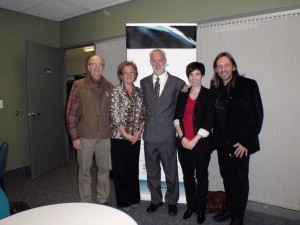From November 5 to the 8, 2012, an important meeting took place in Sudbury between CEGEP Marie-Victorin, holder of a UNESCO Chair in applied research for education in prison, and Collège Boréal in the context of “Education, a meeting toward freedom”, a project supported by the RCCFC. The purpose of the meeting was to share the different practices implemented for young people and adults with a criminal record in this city of Ontario, as well as to outline the mission of the CEGEP Marie-Victorin’s UNESCO Chair in applied research for education in prison.

- Mr. Raoul Cantin, Mrs. Nicole Lefebvre, Mr. Daniel Bouchard, Ms Tina Montgomery, Mr. Jean-Pierre Simoneau
College representatives
Mr. Raoul Cantin is a consultant for CEGEP Marie-Victorin in matters relating to teaching in a prison environment and an ex-regional administrator in education within the Correctional Service of Canada, Quebec region. At Collège Boréal, Mrs Nicole Lefebvre is the coordinator of the program “Special education techniques”; Mr. Daniel Bouchard is a teacher in the “Rehabilitation techniques and criminal justice” program; and Mrs. Tina Montgomery is the dean of “Technologies, justice and administrative sciences”. Representing CEGEP Marie-Victorin is Mr. Jean-Pierre Simoneau, director of operations of the UNESCO Chair in applied research for education in prison.
The representatives of both colleges visited three establishments over the course of a few days: Collège Boreal, the Cecil Facer Centre for young offenders and the Sudbury prison. The stay was concluded by a luncheon.
Visit of Collège Boréal
Collège Boréal provides training to a French-speaking clientele, both young and adult. One of its particularities is that 14 of the 62 programs offered are covered by the “Boréal” warranty: the college is committed to providing additional free full-time training to graduates who do not succeed in finding employment in their field of study in the twelve months following graduation. Another noteworthy fact: since September 2012, each student receives an iPad as a support tool for learning, and this technology is supported by the IT service centre or CSI (Centre de service informatique), which is accessible at any time.
Visit of the Cecil Facer Centre
Founded back in the 60s and designed to house over a hundred young francophone offenders, aged between 13 and 17 years, the centre today can accommodate a maximum of 32 young people. It offers them access to larger spaces, but conversely this has deprived them of access to places like the library, now closed due to lack of resources.
Courses in the centre are given by the Rainbow school board: basic academic courses and a few initiation programs to vocational training for which the students can obtain an official accreditation. Some of the Collège Boréal students enrolled in Rehabilitation techniques and criminal justice and Special education techniques also serve as resources for the Centre in the role of interns. According to our observations, the Cecil Facer Centre is an environment conducive to providing educational programs to small groups of young people.
Tour of the Sudbury prison
Sudbury prison is a bilingual provincial detention establishment inaugurated at the beginning of the 20th century and still very well preserved today. With a maximum capacity of 200 inmates and defendants, both men and women, it is not uncommon for this number to be significantly exceeded and thus for common living areas to be shared.
Outside of their daily work chores, prison inmates have access to some programs: chaplaincy offered by a member of the clergy, alcoholics anonymous and narcotics anonymous services provided by volunteers, anger awareness management, arts and crafts workshops directed by the Elizabeth Fry agency (available exclusively for women), as well part-time educational training offered by the Rainbow school board. We were impressed with the efforts made by the establishment to provide these programs in a context of high security.
Luncheon
The luncheon which lasted an entire afternoon consisted of a meeting between various players in the field of education and resource persons working with individuals having a criminal record. The goal was to share the various practices currently implemented for young people and adults, both men and women, with a criminal record in the greater Sudbury region, and to help publicize the mission of CEGEP Marie-Victorin’s UNESCO Chair in applied research for education in prison.
At the end of the exchanges, several participants expressed the desire to have other similar meetings, at least once a year, with an even greater participation of administrators, stakeholders and beneficiaries to shed light on the best and worst practices and to discuss the development of new intervention models adapted to persons with a criminal record in institutions or in the community.
In the aftermath, Mrs. Tina Montgomery and Mrs. Nicole Lefebvre as well as Mr. Daniel Bouchard of Collège Boréal all expressed the desire for their college to become an associate member of the UNESCO Chair in applied research for the education in prison. Their request was accepted at the fourth meeting of the steering committee of the UNESCO Chair in December 2012.


